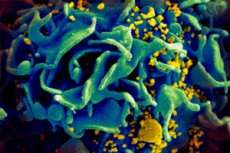Pharmaceutical company urged to share new 'breakthrough' HIV drug
Last reviewed: 14.06.2024

All iLive content is medically reviewed or fact checked to ensure as much factual accuracy as possible.
We have strict sourcing guidelines and only link to reputable media sites, academic research institutions and, whenever possible, medically peer reviewed studies. Note that the numbers in parentheses ([1], [2], etc.) are clickable links to these studies.
If you feel that any of our content is inaccurate, out-of-date, or otherwise questionable, please select it and press Ctrl + Enter.

More than 300 politicians, health experts and celebrities have called on US pharmaceutical company Gilead to allow the production of cheap, generic versions of a promising new HIV drug so it can reach people in developing countries who are hit hardest by the deadly disease.
The drug Lenacopavir could be a "real breakthrough" in the fight against HIV, according to an open letter to Gilead CEO Daniel O'Day signed by a number of former world leaders, AIDS groups, activists, actors and others.
Lenacopavir, which was approved for use in the United States and European Union in 2022, only needs to be administered twice a year, making it especially suitable for people typically "excluded from high-quality health care," the open letter says.
"We call on Gilead to ensure that people living with or at risk of HIV in the Global South have access to this innovative drug at the same time as those in the Global North," the letter's authors added.
The signatories called on Gilead to license the drug through the UN-backed Patent Medicines Pool, which would allow the production of cheaper generic versions.
Two thirds of the 39 million people living with HIV in 2022 were in Africa, according to the World Health Organization. Africa also accounted for 380,000 of the 630,000 AIDS-related deaths worldwide that year, WHO data showed.
'Horror and shame' The letter states that "the world now remembers with horror and shame that it took 10 years and 12 million lives lost before generic versions of the first antiretroviral drugs became available worldwide."
"This innovation could help end AIDS as a public health threat by 2030 - but only if everyone who could benefit from it could access it."
Because it requires only two injections per year, the drug may be especially important for those who face stigma in HIV treatment, including young women, LGBTQ+ people, sex workers and people who use drugs, the letter says.
The letter's signatories include former heads of state, including former Liberian President Ellen Johnson Sirleaf and former Malawi President Joyce Banda.
UNAIDS Executive Director Winnie Byanyima and other humanitarian figures also signed the letter, as did actors including Gillian Anderson, Stephen Fry, Sharon Stone and Alan Cummings.
Another signatory, Françoise Barré-Sinoussi, the French scientist who discovered the HIV virus, lamented that “it is not science, but inequality that is the greatest obstacle in the fight against AIDS.”
On behalf of the scientists who paved the way for such new drugs, "I urge Gilead to eliminate much of this inequity and take a monumental step toward ending the AIDS pandemic," she said in a statement.
Lenacopavir, sold under the brand name Sunlenca, has been shown to reduce "viral load in patients with infections resistant to other treatments," according to the European Medicines Agency.
